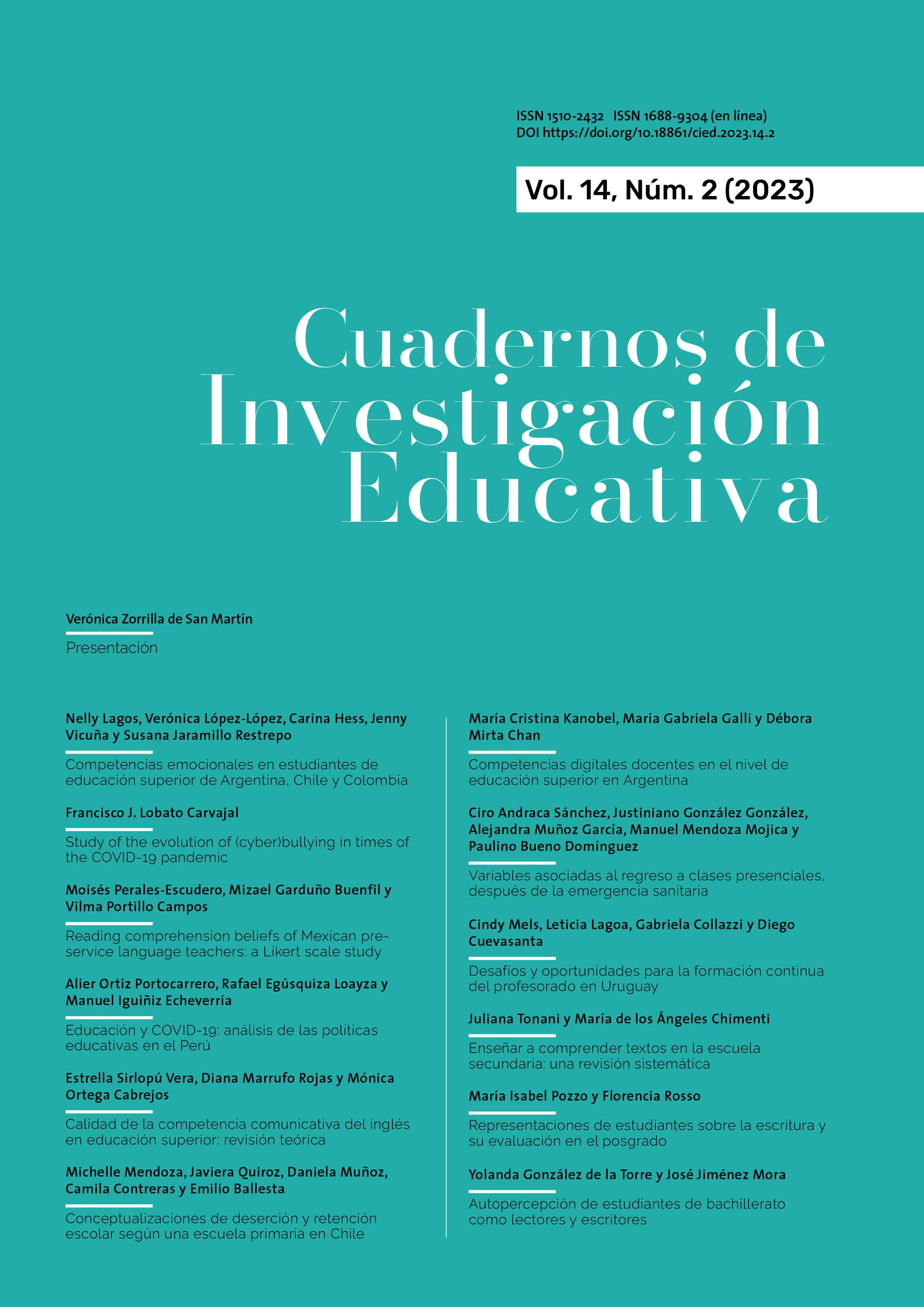Challenges and opportunities for teacher professional development in Uruguay
DOI:
https://doi.org/10.18861/cied.2023.14.2.3430Keywords:
teacher education, professional development, distance education, South America, qualitative researchAbstract
Continuing teacher education is a necessary component of educational systems capable of attending to the demands and educational challenges in a fast–changing world. However, several barriers obstruct teachers' participation in professional development initiatives, particularly in Latin America. The incorporation of ICT in its design may help to overcome certain obstacles. This paper proposes, based on a case study of public secondary education in Uruguay, to (1) explore the obstacles that teachers encounter regarding their participation in initiatives of lifelong professional learning and (2) collect elements that should be considered when designing an online initiative, for it to be considered useful and valid. Fifty-four teachers from 2 secondary schools in Montevideo (59,2 %) and two schools in the country's interior (40,8 %) participated in focus group discussions. Using a thematic framework analysis approach, we established emerging themes referring to the potential of lifelong learning, preferred pedagogical strategies, time investment, teamwork, encounters with others, and specific preferences regarding digital tools and activities. Beyond the concrete recommendations regarding the design of professional development initiatives for teachers incorporating ICT that can be drawn from this study, it also contributes elements for understanding the processes that affect the participation and adherence of teachers in formal professional development activities, contextualized within the structural challenges faced by the teacher profession in the region.
Downloads
References
Báez, A., Bañuls, G., Behrendt, A., García, J., Lugo, M., & Tiramonti, G. (2013). Aportes para (re)pensar el vínculo entre Educación y TIC en la región. FLACSO Uruguay.
Banco Mundial (2018). World Development Report 2018: Learning to Realize Education’s Promise. World Bank. https://elibrary.worldbank.org/doi/abs/10.1596/978-1-4648-1096-1
Barbour, R. (2008). Introducing Qualitative Research. Sage Publications. https://doi.org/10.4135/9780857029034
Du Plessis, E. (2018). Classroom readiness of ODL student teachers. Proceedings of the Multidisciplinary Academic Conference, 13, 1–16.
Elacqua, G., Hincapié, D., Vegas, E., Alfonso, M., Montalva, V., & Paredes, D. (2018). Profesión: Profesor en América Latina: ¿Por qué se perdió el prestigio docente y cómo recuperarlo? Inter–American Development Bank. http://dx.doi.org/10.18235/0001172
Escudero Muñoz, J. M. (2020). Un cambio de paradigma en la formación continuada del profesorado: escenario, significados, procesos y actores. Revista Qurriculum, 33, 97–125. https://doi.org/10.25145/j.qurricul.2020.33.06
Hinostroza, E. (2017). TIC, educación y desarrollo social en América Latina y el Caribe. UNESCO.
Instituto Nacional de Evaluación Educativa (2017). Informe de la Encuesta Nacional Docente 2015. INEEd.
Instituto Nacional de Evaluación Educativa (2019). Informe sobre el estado de la educación en Uruguay 2017–2018. INEEd.
Kazu, H., & Demiralp, D. (2016). Faculty members’ views on the effectiveness of teacher training programs to upskill life–long learning competence. Eurasian Journal of Educational Research, 63, 205–224. http://dx.doi.org/ 10.14689/ejer.2016.63.12
Lombard, M., Snyder‐Duch, J., & Bracken, C. C. (2002). Content analysis in mass communication: Assessment and reporting of intercoder reliability. Human communication research, 28(4), 587–604.
López, N., Lugo, M. T., & Toranzos, L. (2014). Informe sobre tendencias sociales y educativas en América Latina, 2014: políticas TIC en los sistemas educativos de América Latina. IIEP–UNESCO, OEI, SITEAL.
López–Calvo, S., & Cubeiro Rodríguez, N. (2022). Actividades formales para el desarrollo profesional docente: estudio de caso desde las ecologías de aprendizaje. Revista de Estudios e Investigación en Psicología y Educación, 9, 146–156. https://doi.org/10.17979/reipe.2022.9.0.8903
Mancebo, E. (2019). Navegando entre la tradición normalista y la universitaria: la institucionalidad de la formación docente inicial en Uruguay (2005–2019). Cuadernos de Investigación en Educación, 10(1), 85–104. http://dx.doi.org/10.18861/cied.2019.10.1.2882
McIntosh, C. (2005). Introduction. En C. McIntosh & Z. Varoglu (Eds.), Lifelong Learning & Distance Higher Education (pp. 1–11). UNESCO & Commonwealth of Learning.
Organización para la Cooperación y el Desarrollo Económicos (2019). TALIS 2018 Results (Volume I): Teachers and School Leaders as Lifelong Learners. OECD Publishing.
Pilgrim, M., Hornby, G., & Macfarlane, S. (2018). Enablers and barriers to developing competencies in a blended learning programme for specialist teachers in New Zealand. Educational Review, 70(5), 548–564. https://doi.org/10.1080/00131911.2017.1345860
Portillo, S., Castellanos, L., Reynoso, O., & Gavotto, O. (2020). Enseñanza remota de emergencia ante la pandemia Covid–19 en Educación Media Superior y Educación Superior. Propósitos y Representaciones, 8(SPE3). http://dx.doi.org/10.20511/pyr2020.v8nSPE3.589
Ritchie, J., Lewis, J., Nicholls, C. M., & Ormston, R. (2013). Qualitative research practice: A guide for social science students and researchers. Sage Publications.
Samkange, W. (2013). Training teachers at a distance: perceptions ad challenges of open and distance learning (Odl) in teacher education: the Zimbabwean experience. Turkish Online Journal of Distance Education, 14(4), 222–234.
Silva, J., Usart, M., & Lázaro–Cantabrana, J. (2019). Teacher’s digital competence among final year Pedagogy students in Chile and Uruguay. Comunicar, 61, 33–43.
Snape, P. (2017). Enduring learning: integrating 21st soft skills through technology education. Design and Technology Education, 22(3).
Thorpe, M. (2005). The Impact of ICT on Lifelong Learning. En C. McIntosh & Z. Varoglu (Eds.), Lifelong Learning & Distance Higher Education (pp. 23–32). UNESCO & Commonwealth of Learning.
Tondeur, J., Valcke, M., & Van Braak, J. (2008). A multidimensional approach to determinants of computer use in primary education: Teacher and school characteristics. Journal of Computer Assisted Learning, 24(6), 494–506. https://doi.org/10.1111/j.1365-2729.2008.00285.x
UNESCO (2013). Antecedentes y criterios para la elaboración de políticas docentes en América Latina y el Caribe. UNESCO.
UNICEF (2019). Global Framework on Transferable Skills. UNICEF.
Vaillant, D. (2016). El fortalecimiento del desarrollo profesional docente una mirada desde Latinoamérica. Journal of Supranational Policies of Education, 5, 5–21. https://doi.org/10.15366/jospoe2016.5
Van Weert, T. J. (2006). Education of the twenty–first century: New professionalism in lifelong learning, knowledge development and knowledge sharing. Education and Information Technologies, 11, 217–237.






